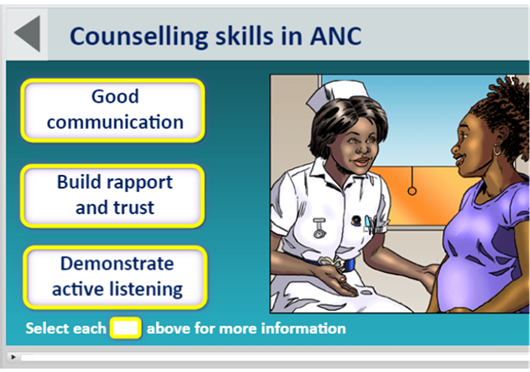
Through our ongoing partnership with Jhpiego, Mwabu have developed e-learning courses for healthcare providers in Zambia working in maternal and child healthcare. This project is part of the Maternal & Child Survival Programme (MCSP), a multi-partner, flagship program in support of USAID’s priority goal of preventing child and maternal deaths.
This month marks the successful completion and launch of four new e-learning courses, covering:
- Antenatal Care
- Maternal, Adolescent, Infant and Young Child Nutrition
- Consolidated HIV
- Integrated Management of Acute Malnutrition - Out Patient Care
Jhpiego partners with the Zambia Ministry of Health (MoH) to deliver the project; the courses have been well received by the MoH team and will now be implemented in training to bring up-to-date information to the hands of frontline health workers.
Each course consists of interactive digital content with engaging artwork, voicing and video. Each module includes case studies so understanding can be applied to real-life examples, plus assessment in the form of knowledge checks. Mwabu’s solution tracks the progress of learners as they work through the digital content and includes tests to be completed before and after training, so that learning outcomes can be evaluated.
Mwabu designs bespoke e-learning content across a wide range of topics, with public or private sector organisations. To date Mwabu has designed content for a range of organizations in Zambia, from healthcare to wildlife conservation.
In Zambia MCSP has supported the Government in implementing its reproductive, maternal, newborn, child, adolescent health and nutrition programme in four provinces through:
- Targeted technical assistance to district health offices;
- Collaborating with Zambian organisations for institutional strengthening; and
- Developing e-learning courses for frontline healthcare providers.
The programme aims to increase the availability, demand and uptake of high-quality health and nutrition services for mothers, newborns, children and adolescents, and strengthen health systems at the national and sub-national levels.





